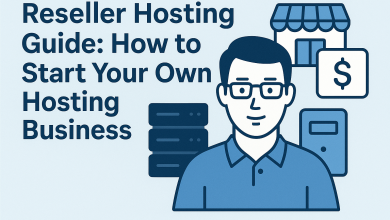In today’s digital age, having a website is almost essential—whether you’re running a business, starting a blog, or building an online portfolio. But one fundamental concept that often gets overlooked is web hosting. So, what exactly is web hosting, and why does it matter?
Let’s break it down in simple terms.
What Is Web Hosting?
Web hosting is the service that allows your website to be accessible on the internet. Think of it like renting space on the internet—just like a physical store needs a place to operate, your website needs a server to “live” on.
A web host is a company that provides the technology and services needed for your website to be viewed online. These services include storing your website’s files (like HTML, images, and CSS) on a powerful computer called a server.
When someone types your website address (domain name) into their browser, the internet connects them to the server where your site is stored, and—voilà!—your site appears.
Types of Web Hosting Explained
Not all hosting is created equal. Here are the main types of web hosting:
1. Shared Hosting
- Best for: Beginners, small blogs, personal websites.
- How it works: Multiple websites share the same server resources.
- Pros: Affordable, easy to set up.
- Cons: Slower performance, limited control.
2. VPS Hosting (Virtual Private Server)
- Best for: Growing websites that need more power.
- How it works: Still shared, but each site has its own dedicated slice of resources.
- Pros: More control, better performance than shared hosting.
- Cons: More expensive, requires some technical knowledge.
3. Dedicated Hosting
- Best for: Large websites or applications with high traffic.
- How it works: You get an entire physical server to yourself.
- Pros: Maximum performance and customization.
- Cons: Expensive, complex to manage.
4. Cloud Hosting
- Best for: Scalable applications, eCommerce, startups.
- How it works: Your website runs on a network of servers (the cloud).
- Pros: Highly scalable, reliable, pay-as-you-go.
- Cons: Pricing can be confusing, technical learning curve.
5. Managed WordPress Hosting
- Best for: WordPress users who want simplicity.
- How it works: Hosting optimized specifically for WordPress.
- Pros: Fast, secure, hassle-free.
- Cons: Limited to WordPress, pricier than shared hosting.
Why Web Hosting Matters
Good web hosting is more than just storage. It affects:
- Website speed: Faster websites rank better on search engines and keep visitors longer.
- Security: A quality host protects your data from hackers and malware.
- Uptime: Reliable hosting ensures your site is available around the clock.
- Support: When things go wrong, responsive support can save your day (or business).
Choosing the Right Web Hosting Provider
When picking a web host, consider:
- Your website’s size and traffic expectations.
- Budget.
- Ease of use and customer support.
- Backup and security features.
- Room for growth (scalability).
Popular and trusted web hosting providers include HawkHost, Bluehost, SiteGround, Hostinger, A2 Hosting, and Cloudways, each with its own strengths.
Final Thoughts
Web hosting is the foundation of your website. It’s what keeps your site online, fast, and secure. Whether you’re launching a passion project or building the next big eCommerce brand, choosing the right hosting service is a crucial first step.
Invest the time to understand your needs, compare providers, and pick a plan that balances performance, price, and peace of mind.





